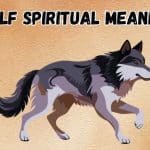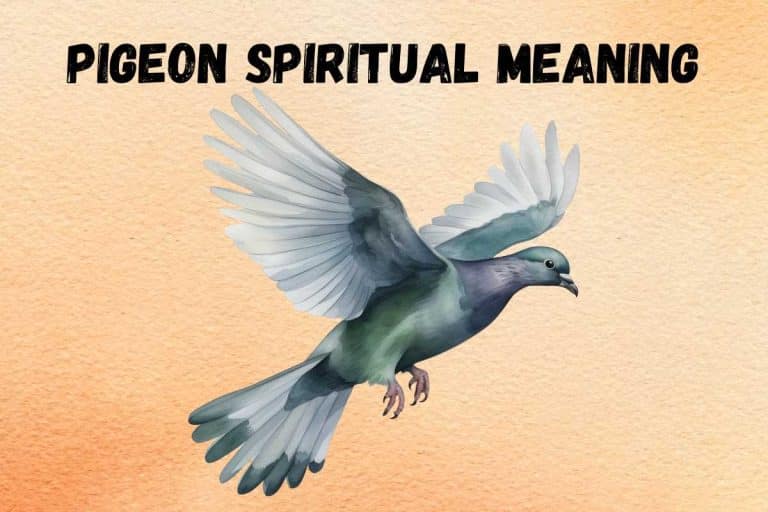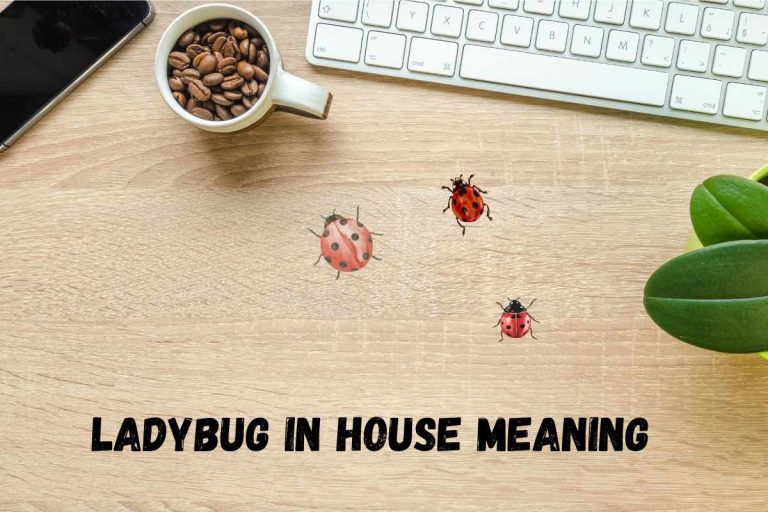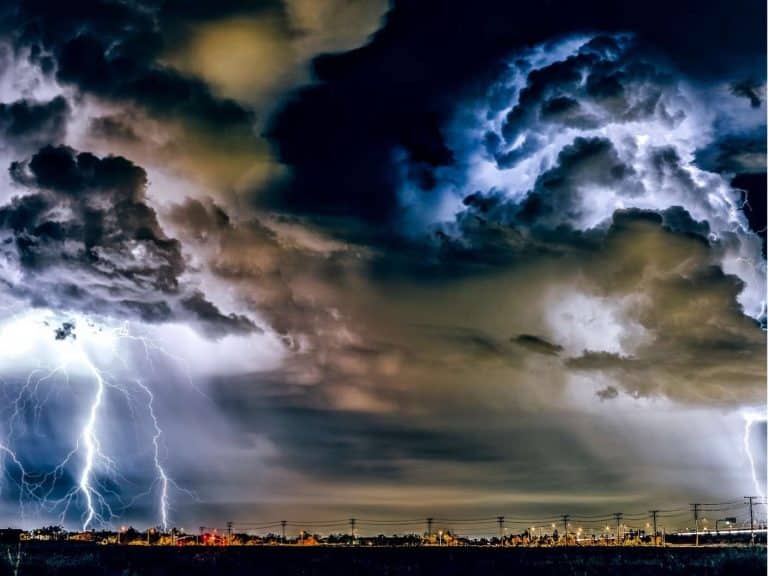7 Spiritual Meanings of Skunk and Symbolism (+Totem & Spirit)

Skunks are fascinating creatures often recognized by their distinctive black and white stripes and their notorious defense mechanism. Though they might be best known for their pungent spray, skunks hold deep spiritual significance and symbolism across different cultures.
In this article, we’ll explore the various spiritual meanings of skunks and how they can serve as powerful totems and spirit animals. From symbolizing self-respect and setting boundaries to representing transformation and introspection, skunks offer valuable life lessons.
Understanding these meanings can enhance your spiritual journey and provide deeper insights into your personal growth. So, let’s dive into the captivating world of skunk symbolism and discover what these unique animals can teach us.

Key Takeaways
Skunk Symbolism and Meaning
The skunk belongs to its own unique family, Mephitidae, which includes several species of skunks and “stink badgers.” Initially, skunks were classified under the mustelid family, which encompasses ferrets, otters, and weasels, primarily due to the shared characteristic of stink glands. However, skunks and stink badgers have since been reclassified due to their significant genetic differences from mustelids, warranting a distinct family classification.
A single whiff of a skunk’s trademark odor is often enough to repel even the most formidable predators, such as bears. Dog owners, in particular, are well-acquainted with the skunk’s potent defense mechanism.
Since skunks are adept at thriving in both suburban and urban environments, many North American dog owners have their fair share of skunk encounter stories, often involving frantic tomato juice baths to neutralize the odor.
The skunk’s powerful aroma links it to themes of rot, decay, and poor hygiene, yet also to self-defense, bravery, and pluck. Despite its pungent method, the skunk’s primary goal is self-preservation. Remarkably, skunks have evolved to utilize a non-lethal means of deterring predators.
Unlike poisoning or envenomating, the skunk’s spray, while extremely unpleasant, is ultimately harmless. This positions skunks as symbols of ingenuity, strategy, compassion, adaptability, and mercy.
Furthermore, the skunk’s striking black and white coloration symbolizes duality and balance. This duality can be interpreted as the coexistence of opposites within nature and within ourselves, reminding us of the nuanced balance between different forces and aspects of life.
The skunk’s unique attributes make it a compelling symbol of survival through non-violent means, embodying a blend of strength and compassion.
What Does It Mean When You See a Skunk?
Seeing a skunk can carry various interpretations depending on the context. Generally, skunks symbolize self-respect and the importance of maintaining one’s integrity. They teach us to stand up for ourselves and not be afraid to assert our boundaries.
Skunks are also associated with heightened awareness and the ability to navigate through challenging circumstances with grace and poise.
Observing a skunk may prompt you to reflect on your personal boundaries, how you manage interpersonal relationships, and whether you are respecting yourself and others. It’s a call to evaluate the way you interact with the world, ensuring that you maintain a balance between self-protection and openness.
Spiritual Meanings of Skunk
1. Protection and Boundary Setting
Skunks symbolize the importance of protecting oneself from harm. With their distinctive warning stripes and potent spray, they demonstrate a powerful method of self-defense. They teach us to set clear boundaries with others, ensuring our personal space and well-being are respected. By observing skunks, we can learn the value of standing our ground and the necessity of maintaining healthy boundaries in our relationships.
2. Self-Respect and Confidence
A skunk’s confident demeanor reminds us to walk with self-assurance. It encourages respect for oneself and one’s abilities, showing that even those who might be underestimated can command respect through their presence and self-belief. This teaches us the importance of valuing our own worth and standing tall regardless of others’ perceptions.
3. Non-Aggressive Defense
Skunks use their unique defense mechanism only when absolutely necessary, demonstrating the power and wisdom of non-aggressive solutions. By relying on their distinctive spray as a last resort, skunks teach us to handle conflicts with grace, patience, and calm. This approach reminds us that avoiding aggression can often lead to more peaceful and effective resolutions, ultimately fostering better relationships and understanding.
4. Awareness and Mindfulness
Skunks are highly aware of their surroundings, reminding us to stay mindful and present in our own lives. This keen awareness allows them to navigate their environment safely and avoid potential threats. By adopting a similar approach, we can better handle life’s challenges and make more informed decisions, leading to a more balanced and harmonious existence.
5. Solitude and Self-Reliance
Often seen alone, skunks represent the strength found in solitude. They encourage self-reliance and inner growth. By navigating their environment independently, skunks demonstrate the power of being comfortable in one’s own company and the importance of developing personal resilience. They remind us that solitude can be a source of strength and introspection, leading to deeper self-awareness and personal development.
5. Attracting Positive Energy
The skunk’s distinct presence naturally draws attention, symbolizing the attraction of positive energy. Its unique markings and confident demeanor teach us to emit positivity to attract good things into our lives. Just as the skunk stands out in its environment, we too can stand out by radiating positive energy, thus inviting positive experiences and relationships into our lives.
6. Respect and Dignity
Skunks carry themselves with an air of dignity and composed grace, reminding us to always maintain self-respect and poise in every situation. They teach us to command respect not through aggression or force, but through our honorable actions and the way we present ourselves to the world. By observing skunks, we learn the importance of inner confidence and the ability to stand tall, no matter the circumstances.
7. Balance and Harmony
Skunks balance their boldness with a non-confrontational nature. Despite their distinct markings and strong defensive abilities, they prefer to avoid conflict whenever possible. They teach us to find harmony between assertiveness and peace, showing that true strength lies in knowing when to stand your ground and when to seek tranquility.
Skunk Symbolism in Different Cultures and Contexts
1. Skunk Native American Symbolism
Among certain Native American tribes, the skunk was revered for its perceived exceptional healing powers. The Cherokee people practiced a unique custom of hanging a dead skunk outside the home of someone who had fallen ill, believing that the skunk’s potent odor could drive out disease.
Some tribes also associated the skunk with death, sorcery, and malevolent magic. In various legends, skunks are depicted as fearsome creatures capable of spraying fatal poisons. These stories often recount how a great hero shrunk the skunk down to its harmless current form.
Moreover, the skunk serves as a clan animal for various tribes, symbolizing the strength and resilience of a family or group. In some cultures, the skunk is also seen as a symbol of respect and self-assurance, embodying the idea of standing one’s ground without aggression. This multifaceted symbolism highlights the skunk’s significant cultural role among Native American tribes.
2. Skunk Eastern Symbolism
Skunks, predominantly North American creatures, have a broader geographical presence extending to Central America, South America, and the Caribbean. Absent from the Eurasian continent, their symbolic meanings in Eastern cultures derive either from their distinct traits or comparisons to similar local animals.
Known for their industrious nature, skunks diligently prepare for winter by digging burrows and crafting compartments with leaves and twigs. This behavior symbolizes hard work, home-making, and creativity. However, when skunks inhabit abandoned burrows of other animals, they may represent laziness.
Much of Eastern skunk symbolism also ties to their notorious odor, often seen as a sign of offensiveness. Additionally, skunks are high-risk carriers of the deadly rabies virus, which they can transmit to humans through bites, scratches, or contact.
It’s crucial to avoid physical interaction with skunks and seek medical care if exposure occurs. Not all rabid animals display overt symptoms, making even calm skunks dangerous. Consequently, skunks are often associated with disease, pestilence, madness, and death.
In terms of added information, it is fascinating to note the skunk’s role in ecosystems as both predator and prey. They help control insect and rodent populations but also fall victim to larger predators like coyotes and owls.
This duality emphasizes their adaptability and resilience, further enriching their symbolic significance. Skunks, therefore, embody a complex blend of industriousness, adaptability, and the ever-present threat of danger.
3. Skunk Christianity Symbolism and Biblical Meanings
In Christian symbolism, skunks are often associated with negative aspects such as punishment, impurity, sin, the devil, and even the wrath of God. This connection arises from the skunk’s spray, which is composed of sulfur-containing compounds. Sulfur, referred to as “brimstone” in the Bible, is frequently mentioned alongside Hellfire as a fundamental element of Hell itself.
Despite this predominantly negative symbolism, skunks also possess qualities that can be viewed more positively within Christianity. Their remarkable ability to defend themselves against larger predators can be seen as reminiscent of the biblical story of David and Goliath, where David, a young shepherd, defeated the giant Goliath with just a sling and a few stones. This symbolism underscores the theme that even those who seem small or weak can overcome great challenges with faith and resourcefulness.
Additionally, skunks can be seen as a symbol of God’s protection and the natural defense mechanisms He provides. Just as the skunk uses its spray to ward off danger, believers are encouraged to rely on their faith and the spiritual armor of God to protect themselves from evil and temptation.
In summary, while skunks in Christian symbolism often represent negative elements like sin and divine retribution, they can also embody themes of divine protection and the triumph of the seemingly small over formidable challenges.
4. Skunk Celtic Symbolism
While skunks are not native to the Celtic world and are not typically encountered in Celtic mythology, they can still be analyzed through the lens of Celtic spirituality, which often assigns symbolic significance to animals based on their characteristics.
The skunk’s notable trait of standing its ground against daunting threats can be associated with the ferocity of a warrior and the inner strength of a protector.
In addition to these attributes, the skunk’s distinctive defense mechanism—its potent spray—could symbolize the power of self-defense and the importance of setting boundaries. This aligns with the Celtic value of personal sovereignty and the ability to protect oneself and one’s kin from harm.
Furthermore, the skunk’s solitary nature may reflect a degree of independence and self-reliance, qualities that are also honored in Celtic traditions.
Thus, while skunks may not be traditional symbols in Celtic spirituality, their traits can still resonate with the values and archetypes found within this rich cultural framework.
5. Skunk African Symbolism
The skunk as we know it isn’t found in Africa, but the continent does have a creature known as the “striped polecat,” often referred to as the “African skunk.” Resembling a skunk, this animal produces a similarly potent spray. Unlike true skunks, however, the striped polecat belongs to the mustelid family.
Interestingly, some claim that the African skunk’s odor is even more offensive than that of its American counterparts. African tribes have historically used the skunk’s potent smell as a deterrent against evil and intruders, believing it can repel negative energies and spirits.Skunk in Dreams
Additionally, these animals are seen as brave fighters. In battles, they are known not to hesitate to bite off the genitalia of their adversaries. The African skunk is a nocturnal, carnivorous, and highly communicative animal. When threatened, it issues a loud warning call before deploying its stinky spray.
In African culture, the skunk is associated with ferocity, vulgarity, communication, and creativity. Its particularly strong odor links it with protection and healing, as well as foulness and pollution.
What Does It Mean to Dream About Skunk?
What does it signify when you dream of a skunk? Dreaming about a skunk often relates to concerns about your reputation. It may suggest that you are worried about how others view you.
Beyond reputation, the skunk in your dream can symbolize feelings of frustration, helplessness, and vulnerability. The skunk lacks powerful defenses like its predators but has a unique, albeit less forceful, way of protecting itself. This dream could indicate that you feel cornered or unable to defend yourself adequately.
A skunk dream might be a signal to express your emotions before they lead to an embarrassing outburst. It also emphasizes the importance of standing your ground and voicing your emotions. Don’t let others overpower you with their strong personalities.
Additionally, dreaming of a skunk might highlight the need for self-assertion and preparedness. In situations where you feel threatened or undervalued, remember the skunk’s ingenuity and find your unique way to stand firm and protect your integrity.
Skunk Mythology and Folklore
Skunks feature prominently in many Native American legends, often depicted in varied, symbolic roles. Frequently, these tales present the skunk as a formidable creature that must be reduced to a benign size. In other narratives, humans transform into skunks after suffering mistreatment from their loved ones.
A recurring theme in these myths is the idea that disrespect and arrogance bring about severe repercussions. For example, a Winnebago skunk origin story recounts the tale of a beautiful girl with white hair who becomes obsessed with her own reflection. One day, an unattractive old man tries to court her, but she mocks and insults him, unaware that he is actually the turtle god in disguise. Enraged by her behavior, the turtle god reveals his true, divine form and curses the girl to emit a foul odor for the rest of her life. She is transformed into a small black animal with a single white stripe on her back, thus explaining the origin of the skunk.
Adding to this rich tapestry of folklore, other tribes have their own unique skunk stories. The Cherokee, for instance, tell of a skunk who defeats a malevolent giant by using its potent smell as a weapon. This demonstrates the skunk’s dual nature as both a protector and a creature of consequence.
These stories serve as moral lessons, underscoring the values of humility and respect while also explaining natural phenomena through engaging narratives. The skunk, with its distinctive appearance and powerful defense mechanism, provides a compelling symbol in these cultural legends.
Spiritual Meaning of a Skunk Crossing Your Path
When a skunk crosses your path, it can be a powerful spiritual symbol with deep significance. In many cultures, skunks are seen as creatures of confidence, self-assurance, and even mystique. Their distinct appearance and potent defensive mechanism command respect and attention.
Encountering a skunk may suggest the need to stand your ground and assert your boundaries with confidence. It can also serve as a reminder to respect others’ boundaries and to proceed with caution in situations that require diplomacy and tact. Skunks teach us the importance of balancing assertiveness with gentleness, reminding us that true power often lies in knowing when to act and when to hold back.
Spiritual Meaning of Seeing a Skunk at Night
The spiritual significance of encountering a skunk at night can be particularly profound. Nighttime is often associated with introspection and the subconscious mind, a period when various suppressed thoughts and feelings come to the forefront.
A skunk appearing during this time might signify the need to trust your instincts and be vigilant about your personal space and energy. This alertness can help you navigate through areas of your life where you need stronger boundaries or greater self-awareness.
Additionally, it may indicate that it’s time to confront hidden fears or unresolved issues that have been lingering in your life. This encounter serves as a reminder that personal growth often requires dealing with uncomfortable truths and that protection of one’s energy is essential for maintaining inner peace and balance.
White Skunk Spiritual Meaning
A white skunk, being more uncommon, carries unique spiritual connotations. White animals are generally considered to be symbols of purity, clarity, and spiritual awareness. In many cultures, white creatures are revered for their connections to the divine and the ethereal realms.
A white skunk could represent a message from the spiritual realm emphasizing the importance of clear communication and purity of intent. It may also suggest a need for cleansing or detoxification, both physically and spiritually, in order to achieve a higher state of balance and harmony.
Furthermore, encountering a white skunk might indicate a period of transformation and renewal, urging one to let go of past negativities and embrace a fresh, enlightened perspective. This rare sighting serves as a reminder to stay mindful of the energies we invite into our lives and to consistently strive for spiritual growth and inner peace.
Skunk Spirit Animal
The skunk spirit animal symbolizes self-esteem and authenticity. Individuals guided by this spirit animal must learn to value themselves accurately and live true to their nature. The skunk spirit animal encourages embracing one’s unique identity without holding back or conforming to fit in.
Not everyone may understand those with the skunk spirit animal, but living authentically is crucial for their happiness. The skunk spirit animal seeks genuine, unconditional love and is eager to share this profound love with others. Additionally, this spirit animal embodies fierce protectiveness for loved ones and unyielding bravery. Even when facing insurmountable odds, those with the skunk spirit animal stand firm for truth and justice.
Skunk Totem Animal
The skunk totem animal represents healing and strategy. Despite not possessing the raw strength of predators like the wolf or bear, the skunk uses its unique abilities to outsmart and overcome challenges. This makes the skunk totem a symbol of intelligence and adaptability.
People with the skunk totem animal are natural pacifists. Even when cornered, they strive to avoid causing harm, relying instead on their wit to protect themselves. The skunk’s approach to conflict highlights the importance of resolving issues peacefully and thoughtfully.
Moreover, the skunk totem animal is associated with potent healing energy. In various tribes, the skunk has been revered as a protector against illness and disease. For emotional healing, the skunk teaches us to accept ourselves fully and approach our healing journey with compassion and gentleness. This totem encourages self-love and nurturing one’s own well-being, reminding us of the power of inner peace and resilience.
Skunk Power Animal
The skunk power animal can serve as a powerful ally for those who lead solitary lives. Much like humans who prefer solitude, skunks are typically solitary creatures, except during hibernation in the winter.
If you find yourself losing friends or causing a ‘stink’ when things don’t go your way, the skunk power animal can offer guidance. While not the most socially skilled, this power animal excels in helping individuals break out of their comfort zones.
In addition to its connection with solitude, the skunk power animal is linked with preparation and foresight. During times of distress or uncertainty, look to the skunk as a spirit guide to help you prepare for whatever challenges lie ahead.
Skunks are adept at readying themselves for obstacles and are known for their resilience in difficult situations. Embrace the skunk’s spirit, and you may find yourself better equipped to dig in your heels and outlast adversity.
Is Seeing a Skunk Good Luck or Omen?
Skunk encounters can carry both positive and negative omens, often reflecting deeper emotions and life situations. Coming across a skunk is frequently associated with feelings of fear and anxiety. If you find yourself repeatedly encountering skunks, it might be a sign that you need to confront a fear or challenge that has been causing you distress.
Facing your fears is a central message of a skunk encounter. The skunk symbolizes the courage to delve deep within yourself to discover your inner strength and resilience. Embrace these moments as opportunities for personal growth and empowerment.
In addition to symbolizing fear and courage, a skunk sighting can also represent the need for balance in your life. If you notice skunks appearing more frequently, it may be an indication that some aspect of your life is out of harmony. Take time to reflect and identify areas where balance is lacking, and make the necessary adjustments to restore equilibrium.
Moreover, skunks are known for their distinctiveness and ability to stand their ground. Encountering a skunk might encourage you to embrace your uniqueness and assertiveness. It reminds you to be confident in who you are and to respect your own boundaries.
Skunk Tattoo Meaning
Traditional skunk tattoos can symbolize a multitude of things: danger, fear, solitude, offensiveness, and more. They also often represent self-acceptance, authenticity, and self-love.
Skunks, being solitary and independent animals, thrive in harsh environments. When faced with danger, they provide ample warning before using their foul-smelling spray as a defense mechanism. Therefore, a skunk tattoo can signify both pacifism and self-defense.
For those who have a deep connection with nature or a strong passion for environmental issues, a skunk tattoo can be an excellent embodiment of these values. Discuss your vision and goals with an experienced tattoo artist to ensure that the final design captures your intent precisely.
Skunk tattoos can vary greatly in style, from cute and whimsical to realistic, and they can even be combined with flowers to symbolize contrasting values such as fragrance versus stink, or light versus dark.
Final Words
Skunk symbolism encompasses ideas of danger, fear, warning, and alertness. A skunk might be reminding you to stay aware of your surroundings to protect yourself from harm. Their distinctive black-and-white appearance serves as a clear warning signal to potential predators, highlighting the importance of being vigilant and cautious.
As solitary creatures, skunks exemplify independence and self-reliance. They navigate their lives with minimal social interaction and are adept at fending for themselves. This independence is a powerful symbol for those seeking to strengthen their own self-sufficiency and personal resilience.
We hope this guide assists you in discovering the special meaning and symbolism that the skunk holds for you. Embrace the lessons of the skunk to enhance your self-awareness and resilience in the face of challenges. By observing the skunk’s behavior and traits, you can learn to trust your instincts, set clear boundaries, and face adversity with confidence.
You Might Also Like
1) Javelina Spiritual Meaning, Symbolism and Totem
2) 10 Spiritual Meanings of Black Cat & Symbolism
3) Spiritual Meanings of Seeing A Deer: 2, 3, 4, Female Deers
4) 10 Spiritual Meanings of Bat & Symbolism (A Sign of Death!)













